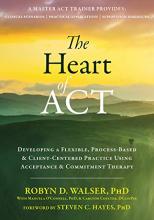
Walser, R. D., O'Connell, M., Coulter, C. (2019) The Heart of ACT: Developing a Flexible, Process-Based, and Client-Centered Practice Using Acceptance and Commitment Therapy. Context Press
In The Heart of ACT, renowned acceptance and commitment therapy (ACT) trainer Robyn Walser explores ACT as a process-based therapy incorporating interpersonal, intrapersonal, and overarching and ongoing processes, as well as the integration of six core components of psychological flexibility to connect clinicians to the dynamic and relational implementation of ACT.
Engaging clinical scenarios, therapeutic insights, and supervision dialogues are offered to help clinicians move beyond their conceptual understanding of ACT principles to master the nuances of the therapeutic relationship at the heart of ACT. Using the tips and strategies in this professional guide, you’ll develop a flexible, grounded, and client-centered practice.
With this comprehensive resource, you’ll learn to cultivate an organic, process-driven practice, grounded in the heart of the therapeutic relationship and responsive to clients in the moment. The Heart of ACT is designed to mimic the supervision experience by presenting material in thought-provoking chapters grounded in real-life clinical situations and challenges.
In the book, you’ll also find supervision dialogues inspired by Walser's work with her supervisees, Carlton Coulter and Manuela O’Connell. Carlton and Manuela comment and ask questions related to the material in the book and their own ACT learning process. These are then addressed by Walser in a dialogue designed to assist clinicians in connecting to the material. These sections mimic the helpful mentoring process of one-on-one training and supervision, and offer insights into specific therapeutic challenges that can unfold in structured conversation.
As the applications of ACT grow, so does the need for up-to-date professional resources. Unlike many advanced ACT books that focus on procedures and techniques, The Heart of ACT focuses on the heart of the therapeutic relationship, as well as the “soft skills” that are difficult to describe, but which often mark the difference between a merely good clinician and an excellent one. If you’re looking to take your ACT delivery to a new, exciting level, this book is a must-have addition to your professional library.
